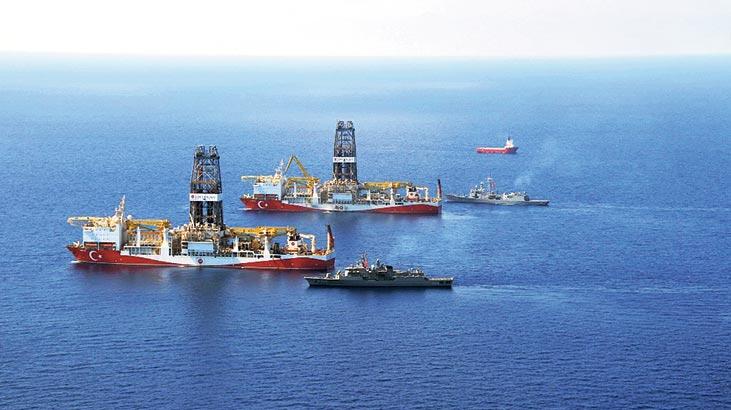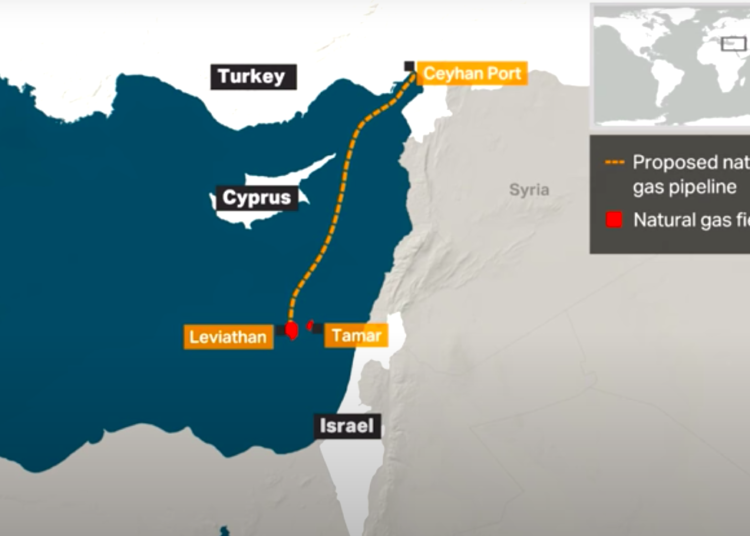Levent Kenez/Stockholm
Turkish President Recep Tayyip Erdoğan is pleased that proposed alternative routes to reduce the dependence of European Union countries on natural gas imported from Russia will increase Turkey’s importance in the region as well as change the way the EU views his government.
At the forefront of these routes is a long-talked-about Israel-Turkey natural gas pipeline project. Speaking to journalists on his return from a visit to Uzbekistan, Erdoğan gave clues about the negotiations, which he had previously said would lead to surprise developments.
Stating that Turkey and Israel had previously agreed on the natural gas pipeline but that the project fell through at the last minute due to problems caused by the government of former Israeli Prime Minister Benjamin Netanyahu, Erdoğan said the project was discussed during the March 9 visit to Ankara of Israeli President Isaac Herzog and that they agreed to work on it.

Erdoğan argued that the Eastern Mediterranean Pipeline Project (EastMed), which includes Greece, Cyprus and Israel, is very costly and not feasible, adding that as a result of cost calculations, the Israeli side made the decision that the most suitable route for the supply of Israeli gas to the European market was through Turkey.
Erdoğan also said he offered to immediately send the ministers of foreign affairs and energy to Israel to start work if the Israeli side wants to take part in the project, adding that Herzog answered positively and suggested that he discuss the project in detail with Israeli Prime Minister Naftali Bennett, who will be visiting Ankara in the near future.
The Turkish president also told journalists that he observed a positive approach towards Turkey during meetings he had at the NATO summit last week in Brussels. He claimed the fact that İstanbul hosted the meeting of the Ukrainian and Russian peace delegations this week had favorably changed the perspective of EU countries towards Turkey, too, and added: “I mean the the entire West. Now our wish is this: I hope Turkey’s place in the eyes of all leaders will be very different.”
Erdoğan also said the Israeli side has already started working on the gas pipeline project and that mutual visits would soon begin. Speaking to the local media last week, Turkish Foreign Minister Mevlüt Cavuşoğlu said he would travel to Israel together with Energy Minister Fatih Dönmez in May.
Although Erdoğan did not give details, it was also mentioned in the Turkish media that Turkey and Israel will be among the partners of a project that will transport northern Iraqi oil to Europe.
According to Israeli officials, the Israel-Turkey pipeline would run 500 to 550 kilometers and cost up to 1.5 billion euros to build, making it more manageable than the 6 billion euro EastMed pipeline proposed to connect Israel with Cyprus, Greece and Italy. However, any subsea line would need to cross the waters of either Cyprus, which Ankara does not recognize, or Syria, with which Ankara has no diplomatic relations and has backed rebels fighting the government in Damascus.

Erdoğan often refers to the withdrawal of US support for EastMed, interpreting it as support for Turkey’s position that it is the most profitable route for the delivery of eastern Mediterranean natural gas to international markets. Following Turkey’s natural gas exploration in the eastern Mediterranean, the EU imposed sanctions on EU candidate Turkey and reduced pre-accession financial assistance for violating the disputed continental shelf with Cyprus and Greece.
If the Israel-Turkey pipeline project gets traction, it could reduce EU pressure on the Erdoğan government. It may also allow Turkey to put an end to its natural gas exploration activities, which the EU opposes. The project will also serve to reduce Turkey’s dependence on Russian natural gas similar to other European countries.
Turkey and Israel had reached an agreement in principle for the pipeline in 2016, and a team of experts from both countries was formed to study the technical details of the project. However, the project could not progress for political reasons and was later shelved.
The European Union provides financial assistance to the Erdoğan government in return for Turkey hosting Syrian refugees and is tolerant of the Erdoğan government’s human rights violations. If the authoritarian Erdoğan assumes an important position in gas supply to Europe, his hand will become stronger against Europe considering that the EU may not insist on democracy and human rights.












